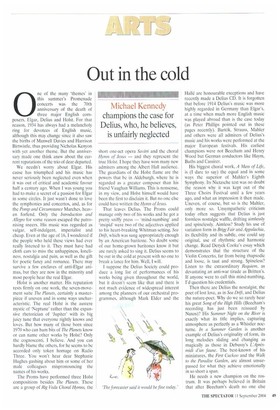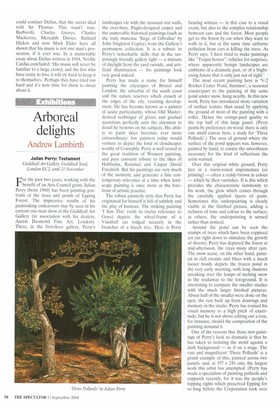Out in the cold
Michael Kennedy champions the case for Delius, who, he believes, is unfairly neglected
One of the many 'themes' in this summer's Promenade concerts was the 70th anniversary of the death of three major English composers. Elgar, Delius and Hoist. For that reason, 1934 has always had a melancholy ring for devotees of English music, although this may change since it also saw the births of Maxwell Davies and Harrison Birtvvistle, thus providing Nicholas Kenyon with yet another theme. But the anniversary made one think anew about the current reputations of the trio of dear departed.
We needn't worry about Elgar. His cause has triumphed and his music has never seriously been neglected even when it was out of critical and academic favour half a century ago. When I was young you had to make a secret of a passion for Elgar in some circles. It just wasn't done to love the symphonies and concertos, and, as for the Pomp and Circumstance Marches, heaven forfend. Only the Introduction and Allegro for some reason escaped the patronising sneers. His music was regarded as vulgar, self-indulgent, imperialist and cheap. Even at the age of 16, I wondered if the people who held these views had ever really listened to it. They must have had cloth ears to miss the unhappiness, loneliness, nostalgia and pain, as well as the gift for poetic fancy and romance. There may survive a few enclaves of anti-Elgar animus, but they are now in the minority and most people hear the real Elgar.
Hoist is another matter. His reputation rests firmly on one work, the seven-movement suite The Planets, certainly a masterpiece if uneven and in some ways uncharacteristic. The real Hoist is the austere mystic of 'Neptune' rather than the expansive rhetorician of 'Jupiter' with its big juicy tune that everyone rightly knows and loves. But how many of those born since 1970 who can hum bits of The Planets know or can name other works by Hoist? Only the cognoscenti. I believe. And you can hardly blame the others, for he seems to be accorded only token homage on Radio Three. You won't hear dear Stephanie Hughes gushing about him or some of her male colleagues mispronouncing the names of his works.
The Proms have performed three Hoist compositions besides The Planets. These are a group of Rig Veda Choral Hymns, the short one-act opera Savitri and the choral Hymn of Jesus — and they represent the true Hoist. I hope they have won many new admirers among the Albert Hall audience. The guardians of the Hoist flame are the powers that be in Aldeburgh, where he is regarded as a greater composer than his friend Vaughan Williams. This is nonsense, in my view, and Hoist himself would have been the first to disclaim it. But no one else could have written the Hymn of Jesus.
That leaves Delius. The Proms could manage only two of his works and he got a pretty sniffy press — 'mind-numbing' and 'insipid' were two of the adjectives applied to his heart-breaking Whitman setting, Sea Drift, which was sung appropriately enough by an American baritone. No doubt some of our home-grown baritones know it but are rarely asked to sing it. Delius seems to be out in the cold at present with no one to break a lance for him. Well, I will.
I suppose the Delius Society could produce a long list of performances of his works being given throughout the world, but it doesn't seem like that and there is not much evidence of widespread interest among the planners of our orchestral programmes, although Mark Elder and the Halle are honourable exceptions and have recently made a Delius CD. It is forgotten that before 1914 Delius's music was more highly regarded in Germany than Elgar's, at a time when much more English music was played abroad than is the case today (as Peter Phillips pointed out in these pages recently). Bartok, Strauss, Mahler and others were all admirers of Delius's music and his works were performed at the major European festivals. His earliest champions were not Beecham and Henry Wood but German conductors like Haym, Buths and Cassirer.
His biggest choral work, A Mass of Life, is (I dare to say) the equal and in some ways the superior of Mahler's Eighth Symphony. Its Nietzsche text was no doubt the reason why it was kept out of the Three Choirs Festival until a few years ago, and what an impression it then made. Uneven, of course, but so is the Mahler, only more so. Unsympathetic criticism today often suggests that Delius is just formless nostalgic waffle, drifting aimlessly and spinelessly. Aimless? Study his use of variation form in Bfigg Fair and Appalachia, its flexibility and its subtle, one could say original, use of rhythmic and harmonic change. Read Deryck Cooke's essay which demonstrates that the structure of the Violin Concerto, far from being rhapsodic and loose, is taut and strong. Spineless? Listen to the extraordinary Requiem, as devastating an anti-war tirade as Britten's. If anyone were to call this mind-numbing, I'd question his credentials.
Then there are Delius the nostalgist, the poet of lost love, as in Sea Dnft, and Delius the nature-poet. Why do we so rarely hear his great Song of the High Hills (Beecham's recording has just been reissued by Naxos)? His Summer Night on the River is exactly what its title implies, capturing atmosphere as perfectly as a Whistler nocturne. In a Summer Garden is another example of Delius's originality of form, its long melodies sliding and changing as magically as those in Debussy's L'Apresmidi dun faune. The best-known of his miniatures, the First Cuckoo and the Walk to the Paradise Garden, are almost unsurpassed for what they achieve emotionally in so short a span.
He needs a new champion on the rostrum. It was perhaps believed in Britain that after Beecham's death no one else could conduct Delius, that the secret died with Sir Thomas. This wasn't true. Barbirolli, Charles Groves, Charles Mackerras, Meredith Davies, Richard Hickox and now Mark Elder have all shown that his music is not one man's possession, if it ever was. In a memorable essay about Delius written in 1944, Neville Cardus concluded: 'His music will never be familiar to a large crowd; and the few who have come to love it will try hard to keep it to themselves.' Perhaps they have tried too hard and it's now time for them to shout about it.











































































 Previous page
Previous page